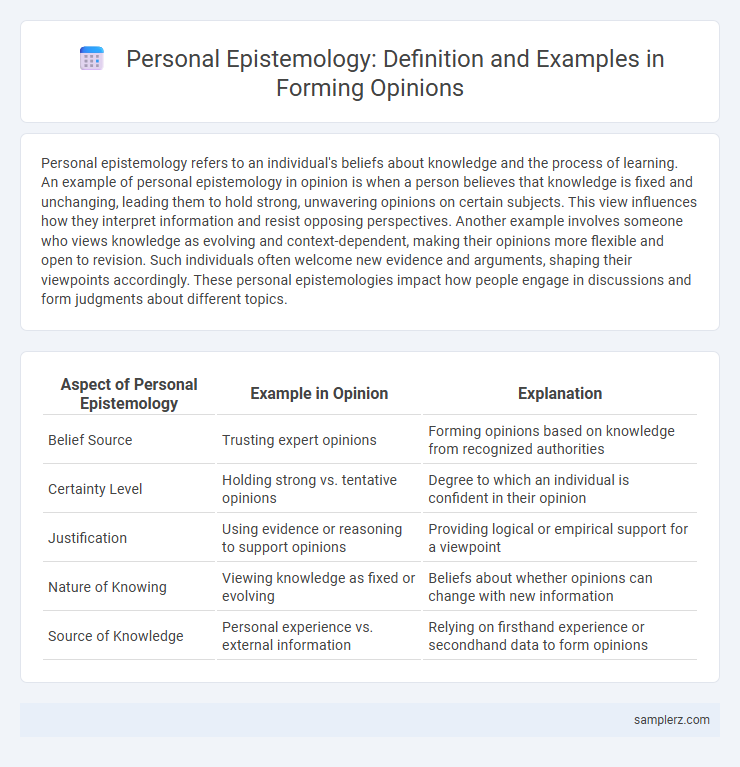Personal epistemology refers to an individual's beliefs about knowledge and the process of learning. An example of personal epistemology in opinion is when a person believes that knowledge is fixed and unchanging, leading them to hold strong, unwavering opinions on certain subjects. This view influences how they interpret information and resist opposing perspectives. Another example involves someone who views knowledge as evolving and context-dependent, making their opinions more flexible and open to revision. Such individuals often welcome new evidence and arguments, shaping their viewpoints accordingly. These personal epistemologies impact how people engage in discussions and form judgments about different topics.
Table of Comparison
| Aspect of Personal Epistemology | Example in Opinion | Explanation |
|---|---|---|
| Belief Source | Trusting expert opinions | Forming opinions based on knowledge from recognized authorities |
| Certainty Level | Holding strong vs. tentative opinions | Degree to which an individual is confident in their opinion |
| Justification | Using evidence or reasoning to support opinions | Providing logical or empirical support for a viewpoint |
| Nature of Knowing | Viewing knowledge as fixed or evolving | Beliefs about whether opinions can change with new information |
| Source of Knowledge | Personal experience vs. external information | Relying on firsthand experience or secondhand data to form opinions |
Understanding Personal Epistemology in Forming Opinions
Personal epistemology shapes how individuals evaluate and interpret information when forming opinions, influencing their criteria for knowledge validation. Understanding one's personal epistemology involves recognizing the sources, certainty, and justification standards relied upon in opinion formation. This self-awareness enhances critical thinking and fosters more coherent and reflective viewpoints.
How Belief Systems Shape Individual Perspectives
Belief systems fundamentally shape individual perspectives by filtering experiences through preexisting cognitive frameworks, influencing how people interpret evidence and form opinions. Personal epistemology, or one's theory of knowledge, affects the degree of openness to new information and the criteria used to evaluate truth claims. This results in diverse viewpoints grounded in varied understandings of knowledge, certainty, and justification.
The Role of Experience in Shaping Opinionated Views
Personal epistemology significantly influences opinion formation as individuals rely on their unique experiences to interpret information and validate beliefs. Experiential knowledge often overrides abstract reasoning, making firsthand interactions critical in shaping deeply held viewpoints. This reliance on experience highlights the subjective nature of opinionated views and explains variability in perspectives across different individuals.
Evaluating Knowledge Sources for Personal Opinions
Evaluating knowledge sources is a crucial aspect of personal epistemology in forming opinions, as it involves assessing the credibility, bias, and relevance of information before acceptance. Individuals apply critical thinking to distinguish between empirical evidence and subjective assertions, ensuring their opinions are well-founded and justified. Trustworthiness of sources, such as peer-reviewed journals or expert testimonies, significantly shapes the reliability of personal beliefs and judgments.
Personal Epistemology and Opinion Formation in Everyday Life
Personal epistemology shapes how individuals evaluate information and form opinions based on their beliefs about knowledge sources and certainty. For example, a person who views knowledge as evolving may remain open to alternative perspectives when discussing controversial topics. This reflective approach influences daily decision-making by fostering critical thinking and adaptability in opinion formation.
Bias Awareness: Reflecting on Our Own Ways of Knowing
Bias awareness in personal epistemology involves critically examining how individual experiences, cultural backgrounds, and cognitive patterns shape one's beliefs and knowledge claims. Recognizing these influences enhances intellectual humility and promotes more accurate, reflective decision-making processes. This self-reflective practice safeguards against confirmation bias and encourages openness to diverse perspectives in forming opinions.
Opinion Diversity Rooted in Different Epistemological Approaches
Opinion diversity often stems from distinct personal epistemologies, where individuals rely on varied sources such as empirical evidence, intuition, or authoritative testimony to form beliefs. These epistemological approaches shape how people interpret information, leading to conflicting yet valid perspectives within societal discourse. Understanding the roots of epistemic diversity enhances tolerance and facilitates constructive dialogue across differing viewpoints.
The Impact of Critical Thinking on Personal Beliefs
Critical thinking reshapes personal epistemology by encouraging individuals to question assumptions and evaluate evidence rigorously, leading to more refined and justified beliefs. This cognitive process enhances self-awareness and fosters intellectual humility, allowing for the revision of previously held opinions based on new information. Consequently, critical thinking strengthens the reliability and coherence of personal belief systems in diverse contexts.
Navigating Subjectivity in Opinion Development
Personal epistemology influences opinion development by shaping how individuals evaluate and integrate subjective experiences with external information. Recognizing the role of cognitive biases and emotional responses helps navigate the complexity of forming balanced viewpoints. Developing metacognitive awareness enhances the ability to critically assess one's own beliefs and adapt opinions based on new evidence.
Constructing Well-Founded Opinions Through Self-Reflection
Constructing well-founded opinions involves a deep engagement with personal epistemology, emphasizing the importance of self-reflection in evaluating one's beliefs and knowledge sources. This process requires critical examination of biases, assumptions, and the reliability of information, fostering intellectual humility and open-mindedness. Through deliberate self-assessment, individuals develop more coherent and justified viewpoints, enhancing the quality of their opinions.

example of personal epistemology in opinion Infographic
 samplerz.com
samplerz.com